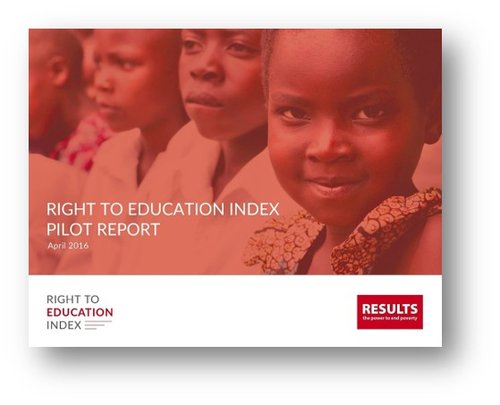Right to Education Index Pilot Report Now Available
April 25, 2016In 2015, RESULTS Educational Fund and partners piloted the Right to Education Index in five countries. The results of that pilot are now available in the Right to Education Index Pilot Report.
By Tony Baker
In 2015, RESULTS Educational Fund and partners piloted the new global accountability tool, the Right to Education Index, in five countries — Chile, Nigeria, the Philippines, Tanzania, and Zimbabwe.
The results of that pilot are now available in the Right to Education Index pilot report. RTEI has proven to be an effective diagnostic tool for identifying barriers to the right to education at the national level. It has also demonstrated itself as a powerful means of building civil society capacity and expertise around the right to education.
The report discusses overall findings of the 2015 pilot, comparative issues across Governance and the 4As (Availability, Accessibility, Acceptability, and Adaptability), select transversal themes such as teachers, private education, and costs of education, and country-specific findings and recommendations from RTEI country partners.
Key findings revealed by RTEI and further by RTEI country
partners include:
- Chile: Lack of protection
of the right to education in the constitution and lack of a national education
plan that works toward free, universal education.
- Nigeria: Unsafe learning
environments and a lack of qualified teachers, with a primary school
pupil-trained teacher ratio of 70:1.
- Philippines: Underpaid and
overburdened teachers, with an entry-level salary lower than that of a military
cadet and a primary school classroom-pupil ratio of 1:75.
- Tanzania: A female marriage
age of 15 as in the Marriage Act of 1971 and no prohibition of corporal
punishment but rather the institutionalization of it through the Corporal
Punishment Act of 1979 and the Government Guidelines of 2000.
- Zimbabwe: No national
education plan for free primary education but rather one that enables school
fees as in the Education Act.
More findings and recommendations from RTEI partners can be found in the pilot report and country briefs.
The RTEI pilot represents a significant achievement in the development and application of a global accountability exercise that has the potential to inspire political dialogue and drive progress towards the realization of the right to education. RTEI is a work in progress, with each round of application further refining key tools and methodology. RESULTS Educational Fund will be conducting a 15-country first official round of RTEI in 2016 and will seek to support a subset of partners to carry forward in-country advocacy strategies based on 2016 findings in 2017.


